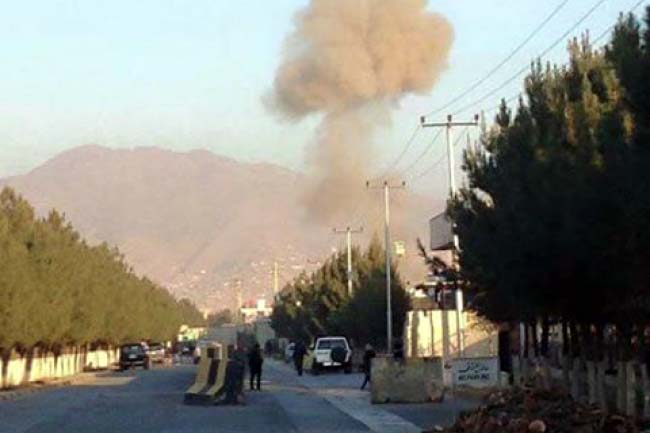Considering the new political stances, it seems that Afghanistan is entering a new chapter of crises. Since beginning of 2017 Afghanistan has been shocking with consecutive deadly attacks. These seem to be the fruit of new emerging games jus been started. According to media reports quoting Local official, Taliban got access to Russian weapons and night vision binoculars the reason behind increased casualties among Afghan forces and falling of some areas in western Farah province. The moral of Taliban enhanced after Moscow hosted a trilateral dialogue with Beijing and Islamabad on the future of Afghanistan. Importantly, left out of the talks were Kabul, Washington and New Delhi—a historic Russian ally now moving closer to the United States. The joint statement released after the dialogue expressed support for talks with the Afghan Taliban and concern over the spread of Daesh group.
The new games are following a series of regional level completions as the United States has been challenged in the Ukraine and Syria by Russia and its allies; Additionally, Moscow has impressively deployed hybrid warfare tactics to create the perception that it has influenced the U.S. presidential election and forged a rift between the incoming commander-in-chief and elements of the U.S. intelligence community. The world is waiting how the incoming Trump Administration would face the threats it poses as well as the potential opportunities it may present.
The new moves mark a definitive departure from Moscow’s decades-old policy toward the region. Pakistan was a strong U.S. ally during most of the Cold War, while the Soviet Union had a defense pact with the nominally non-aligned India. After the Soviet invasion of Afghanistan, Pakistan, in concert with the United States, helped make Afghanistan a graveyard for the Red Army, forcing its withdrawal.
After 9/11, Moscow supported the U.S.-led coalition in Afghanistan, which ousted the Taliban and brought back to power elements of the Northern Alliance that Russia had supported. The post-9/11 Afghan war and broader global war on terror also gave Moscow space to brutally crush the Chechen insurgency, which had been taken over by Salafi jihadists after Russia sidelined Chechen Sufi separatists. Russia also provided diplomatic and logistical support for a sizable U.S. military presence in its backyard. From 2009 into 2015, Russia served as a supply route for U.S. and NATO forces through what was known as the Northern Distribution Network (NDN), which lessened Washington’s dependence on Islamabad for the Pakistan-based ground lines of communication into Afghanistan.
Moscow’s relations with Washington have taken a turn for the worse since 2014, following the Russian intervention in the Ukraine. In the same year, U.S. combat operations in Afghanistan came to an end without having meaningfully weakened the Afghan Taliban. Moscow has had to contend with the reality that there are insufficient U.S. and NATO troops to defeat the Taliban, but still a troubling number of residual Western forces too close to home in its strategic backyard. Additionally, as the Taliban resurges, Islamic State has developed an embryonic presence along the Afghanistan-Pakistan border. Russia has fears about the group using Afghanistan to establish networks nearby in Central Asia. Meanwhile, opium production in Afghanistan continues at near-record level, which severely impacts Russia as it is both a transit route for Europe-bound Afghan opiates and a major consumer market. Russia consumes around a fifth of the world’s illegal opiate supply and is afflicted by a heroin addiction epidemic.
It is in this context that, last year, Moscow has stepped up its engagement with the Afghan Taliban beget two questions. If Russia supports a negotiated settlement to the conflict in Afghanistan, why is blocking a deal that, if successful, could provide a model for a future settlement with the Taliban? And if Moscow is indeed providing lethal support to the Afghan Taliban, are its objectives merely to curry favor with the group and counter Islamic State?
Anyway, Afghanistan is on the eve of becoming more steeped in social and political crises like Syria. The Russia-US relationship has a direct impact on other countries, particularly on a nation like Afghanistan which is located in close proximity to Russia. In new US and Russia policies, if diplomacy does not overcome hostilities, there would be no winner and accordingly Afghan government will face new challenges at multiple levels. For Afghans it is more annoying when they review the several repeated scenarios in the history but no one found to learn from the past. The current government still lacks a true strategy for key reforms at the administrative level and, at the same time, it has failed to bring about good governance and decrease corruption. A recent survey revealed that Afghans pay $3 billion in bribes to get everyday tasks done.
Therefore, The Afghan Nation Unity Government must be warned to stop the repeated scenario here. They would be responsible for losing political achievements obtained within past 15 years at cost of millions of Afghan martyred youth’s life. It is high time to change the course of history and change the internal and external policies based on national interests. Afghanistan is in the axes of regional and global opportunities if the policy makers believe in prosperity and dignity of Afghans.

